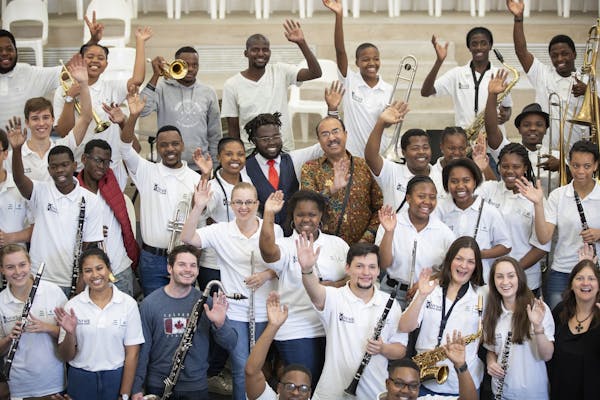DURBAN, SOUTH AFRICA – Backstage before last Friday's concert in Cape Town, the first on this South African tour, bassist Bob Anderson searched for a key to his crate. He hadn't seen his 200-year-old instrument for some 72 hours, and it was time for rehearsal.
"Oh, Bill, do you have your key?" he asked a fellow bassist.
Anderson has been with the Minnesota Orchestra since 1974, and just once in those decades has he ever opened his tall, black, worn crate — labeled BASS 15 — to find his bass damaged. That was in 1998, on the orchestra's European tour. Four basses arrived split.
"We found a shop that could repair them, and they brought a couple basses we could use," he recalled.
This time his crate's odyssey included a stop in Britain, for a performance at the prestigious BBC Proms.
"I got to London," he said, laughing, "and the bass was still in tune."
From there, it journeyed by cargo plane to Munich to Luxembourg to Johannesburg, then took a high-stakes truck ride to Cape Town.
The instruments even need their own kind of visas: About a fifth of the orchestra's instruments are made of materials not allowed under an international treaty called the Convention on International Trade in Endangered Species of Wild Fauna and Flora. Brazilian rosewood, for example. Mother of pearl. Tortoise shell. And ivory — many bows have, on their tip, a piece of ivory the size of a thumbnail.
Orchestras must show that those instruments were fashioned before the treaty went into effect. These papers are presented at every border crossing.
Classical Movements, the Virginia-based company that is handling tour logistics, hired a trucking company that could guarantee climate-controlled cabs and pairs of experienced drivers who trade off.
"There is no time to sleep," said Classical Movements senior vice president Johan van Zyl.
The trip to Cape Town was high-pressure. But the nearly 1,000-mile trek to the next show in Durban, less than two days later, was the real test. Roads here can be tricky. There are weigh stations and flat tires. Bad weather — snow had temporarily closed a major passage — and unexpected incidents.
"The reality is that some of these trucks get hijacked," van Zyl said.
Classical Movements tracks the trucks with GPS and checks the weather obsessively. The snow cleared and, in the end, the trucks arrived early, in just 23 hours.
Anderson's crate was there when he arrived for the Sunday afternoon rehearsal in Durban. He unlocked the case, tuned his instrument, and was in place by showtime at 5 p.m.
